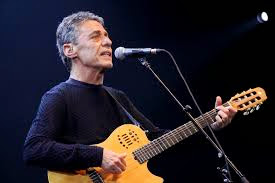
Uma das maiores personalidades de nossa cultura e história musical é sem nenhuma dúvida o carioca Chico Buarque de Holanda.
Para todos os efeitos o tino cultural de Chico Buarque é algo que frutificou na formação intelectual recebida desde a infância, sendo ele, inclusive, de família nobre da alta sociedade dos estados de Pernambuco e Rio de Janeiro.
QUEM É CHICO BUARQUE DE HOLANDA?
Nascido na capital fluminense
em 19 de junho de 1944 o cantor, instrumentista, dramaturgo, escritor, diretor
e multi – plural Chico Buarque de Holanda é filho do historiador Sérgio Buarque
de Hollanda e Maria Amélia Cesário Alvim.
Desde pequeno Chico Buarque teve amplo contato com a cultura e muitos livros da biblioteca particular da família, podendo, deste modo, iniciar seu contato com a leitura. O pai de Chico Buarque mudou-se para São Paulo quando ele tinha apenas dois anos, posto que, como historiador respeitado acabou tornando-se diretor do Museu do Ipiranga.
Tempos depois todos se mudaram para a Itália onde o pai de Chico Buarque foi ser professor na Universidade de Roma. Essa mudança foi fundamental para o jovem Chico Buarque que aprendeu desenvolvendo dois idiomas e falando os dois, tanto o Italiano quanto o Português. Somente aos 16 anos o talentoso rapaz volta ao Brasil e, dois anos após foi que lançou seu primeiro conto.
A carreira de escritor seguia seu caminho, mas o amor pela música acompanhava o rapaz que já tinha suas composições, tocava violão e se destacava pela originalidade.
Foi em 1966 que lançou seu primeiro disco intitulado Chico Buarque de Holanda e concorreu ao Festival de Música Popular Brasileira, vencendo com a música “A Banda”. Foi em 1969 que por questões de ideologia política resolveu se auto exilar na Itália.
O artista mesmo a distância manifestava suas opiniões políticas e se aproximou das ideias socialistas e comunistas imperantes em muitos países europeus na época. O cantor e escritor dedicou-se muito a escrever neste período e pós-exílio ganhando alguns dos maiores prêmios da literatura brasileira, entre eles três prêmios Jabutis, entre outros prêmios.
O cantor foi um colecionador de vitórias nos grandes festivais que eclodiam no Brasil nas décadas de 60, 70 e 80 seja como compositor ou como compositor e intérprete. No Festival de Música Popular Brasileira de 1967 fez um enorme sucesso com a canção Roda Viva onde ele e o Grupo MPB – 4 interpretariam. Nos musicais para teatro e nos filmes Chico Buarque de Holanda é um dos mais ativos compositores, escritores e já até atuou como ator.
Uma das coisas sobre Chico Buarque que pouca gente sabe é que ele nunca foi fã de aparecer em televisão em programas populares. O cantor teve, ainda na década de 60, um entrave com um diretor de televisão e foi embora sem gravar o programa, ainda na extinta TV Excelsior.
Com o diretor da Rede Globo Boni o artista também teve seus entraves e ficou muitos anos cortado da grade, inclusive, sendo proibido de ser mencionado na emissora. Mas depois de alguns anos acabou o cisma e ele chegou a fazer um programa cantando com Caetano Veloso.
One of the greatest personalities of our culture and musical history is, without a doubt, the carioca Chico Buarque de Holanda.
For all intents and purposes, Chico Buarque's cultural acumen is something that bore fruit in the intellectual formation he received from childhood, as he even came from a noble family of high society in the states of Pernambuco and Rio de Janeiro.
WHO IS CHICO BUARQUE DE HOLLAND?
Born in Rio de Janeiro on June
19, 1944, singer, instrumentalist, playwright, writer, director and
multi-plural Chico Buarque de Holanda is the son of historian Sérgio Buarque de
Hollanda and Maria Amélia Cesário Alvim.
Since he was little Chico Buarque had extensive contact with culture and many books from the family's private library, thus being able to start his contact with reading. Chico Buarque's father moved to São Paulo when he was just two years old, since, as a respected historian, he ended up becoming director of the Ipiranga Museum.
Later, they all moved to Italy where Chico Buarque's father went to be a professor at the University of Rome. This change was fundamental for young Chico Buarque, who learned by developing two languages and speaking both, both Italian and Portuguese. Only at the age of 16 did the talented boy return to Brazil and, two years later, he released his first short story.
His career as a writer followed his path, but the love for music accompanied the boy who already had his compositions, played the guitar and stood out for his originality.
It was in 1966 that he released his first album entitled Chico Buarque de Holanda and competed in the Brazilian Popular Music Festival, winning with the song “A Banda”. It was in 1969 that, for reasons of political ideology, he decided to go into exile in Italy.
One of the things about Chico Buarque that few people know is that he was never a fan of appearing on television in popular programs. In the 60s, the singer had an obstacle with a television director and left without recording the program, still on the extinct TV Excelsior.
Muito Bom!
ResponderExcluir